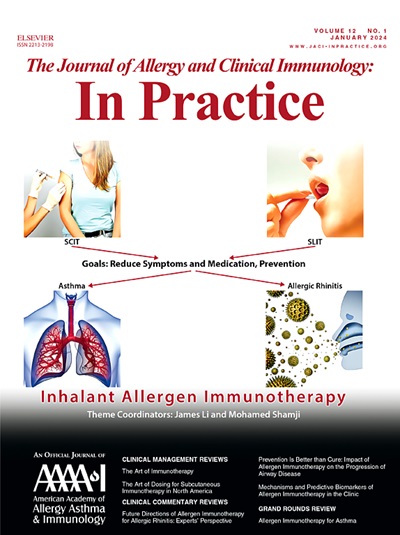Clinical Effects of Polyphenolic Compounds on Allergic Rhinitis: A Systematic Review and Meta-Analysis
IF 6.6
1区 医学
Q1 ALLERGY
Journal of Allergy and Clinical Immunology-In Practice
Pub Date : 2025-09-01
DOI:10.1016/j.jaip.2025.06.032
引用次数: 0
Abstract
Background
Polyphenolic compounds (eg, catechins or quercetin) may reduce hypersensitivity and allergic symptoms, but clinical evidence remains inconsistent.
Objective
To evaluate the therapeutic potential of polyphenolic compounds for managing allergic rhinitis (AR).
Methods
A systematic review and meta-analysis of randomized controlled trials (RCTs) assessed the effects of polyphenolic compounds on AR symptoms and quality of life (QoL).
Results
Thirteen RCTs (823 participants) were included: 7 enrolling patients with seasonal AR and 6 with perennial AR. In seasonal AR, polyphenolic compounds significantly reduced total nasal symptom scores (standardized mean difference [SMD] = 0.75, P = .0001; I2 = 52.8%), sneezing (SMD = 0.58, P = .0042; I2 = 45.6%), and nasal itching (SMD = 0.54, P = .011; I2 = 41.7%). In perennial AR, total nasal symptom scores improved, whereas individual symptoms were inconclusive. The combined analysis of seasonal and perennial AR, along with a sensitivity analysis excluding 2 outlier trials, yielded a more conservative and robust estimate, showing reductions in total nasal symptom scores (SMD = 0.73, P < .0001; I2 = 38.1%), nasal obstruction (SMD = 0.50, P = .0003; I2 = 36.4%), and sneezing (SMD = 0.57, P < .0001; I2 = 25.7%). Overall certainty of evidence for key nasal symptom outcomes was low to very low due to inconsistency and risk of bias. Effects on QoL were not significant.
Conclusion
Polyphenolic compounds may serve as a complementary option for alleviating nasal symptoms in patients with AR, but findings should be interpreted cautiously. Future large-scale, rigorous RCTs are needed.
多酚类化合物治疗变应性鼻炎的临床疗效:系统综述和荟萃分析。
背景:多酚类化合物(如儿茶素或槲皮素)可减轻超敏反应和过敏症状,但临床证据仍不一致。目的:评价多酚类化合物治疗变应性鼻炎(AR)的疗效。方法:对随机对照试验进行系统回顾和荟萃分析,评估多酚类化合物对AR症状和生活质量(QoL)的影响。结果:纳入13项随机对照试验(823名受试者):7名入选的季节性AR患者,6名入选的常年性AR患者。在季节性AR中,多酚类化合物显著降低了鼻症状总分(标准化平均差[SMD] = 0.75, p = 0.0001;I2 = 52.8%)、打喷嚏(SMD = 0.58, p = 0.0042;I2 = 45.6%)、鼻痒(SMD = 0.54, p = 0.011;I2 = 41.7%)。在常年性AR中,总的鼻症状评分有所改善,而个别症状则不确定。季节性和常年性AR的综合分析,以及排除两项异常试验的敏感性分析,得出了更保守和稳健的估计,显示鼻腔症状总分降低(SMD = 0.73, p < 0.0001;I2 = 38.1%)、鼻塞(SMD = 0.50;P = 0.0003;I2 = 36.4%),打喷嚏(SMD = 0.57;P < 0.0001;I2 = 25.7%)。由于不一致和偏倚风险,关键鼻症状结局的证据总体确定性低至极低。对生活质量的影响不显著。结论:多酚类化合物可作为缓解AR患者鼻部症状的补充选择,但研究结果应谨慎解读。未来需要大规模、严格的随机对照试验。
本文章由计算机程序翻译,如有差异,请以英文原文为准。
求助全文
约1分钟内获得全文
求助全文
来源期刊

Journal of Allergy and Clinical Immunology-In Practice
ALLERGYIMMUNOLOGY-IMMUNOLOGY
CiteScore
11.10
自引率
9.60%
发文量
683
审稿时长
50 days
期刊介绍:
JACI: In Practice is an official publication of the American Academy of Allergy, Asthma & Immunology (AAAAI). It is a companion title to The Journal of Allergy and Clinical Immunology, and it aims to provide timely clinical papers, case reports, and management recommendations to clinical allergists and other physicians dealing with allergic and immunologic diseases in their practice. The mission of JACI: In Practice is to offer valid and impactful information that supports evidence-based clinical decisions in the diagnosis and management of asthma, allergies, immunologic conditions, and related diseases.
This journal publishes articles on various conditions treated by allergist-immunologists, including food allergy, respiratory disorders (such as asthma, rhinitis, nasal polyps, sinusitis, cough, ABPA, and hypersensitivity pneumonitis), drug allergy, insect sting allergy, anaphylaxis, dermatologic disorders (such as atopic dermatitis, contact dermatitis, urticaria, angioedema, and HAE), immunodeficiency, autoinflammatory syndromes, eosinophilic disorders, and mast cell disorders.
The focus of the journal is on providing cutting-edge clinical information that practitioners can use in their everyday practice or to acquire new knowledge and skills for the benefit of their patients. However, mechanistic or translational studies without immediate or near future clinical relevance, as well as animal studies, are not within the scope of the journal.
 求助内容:
求助内容: 应助结果提醒方式:
应助结果提醒方式:


